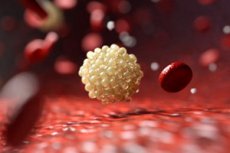Regulating cholesterol levels may be key to improving cancer treatment
最近審查:14.06.2024

A team of researchers from Aarhus University has made a remarkable discovery that could improve the treatment of cancer and a number of other diseases. Their research was published in Nature Communications.
The key to success lies in regulating cholesterol levels, which could make existing treatments more effective.
“We have identified a new mechanism that may regulate an important immune pathway in the fight against cancer cells, and this gives us a deeper understanding of how the body's defenses against disease can be activated,” explains Professor Martin Roelsgaard Jacobsen from the Department of Biomedicine, one of the last authors of the study.
The researchers focused on the STING protein, an important element of the immune system that protects against cancer cells. By manipulating cholesterol levels, they were able to improve the function of the STING protein, revealing new ways to strengthen the body's natural defenses against cancer.
Effective cancer treatment depends on the strength of the patient's immune system and how well it can be boosted to destroy cancer cells.
Cancer treatment requires a combination of strategies that induce local immune activation in the tumor, recruit cytotoxic T cells, and stimulate broader immune cell activation, Jacobsen said. And that's where the new mechanism opens up new possibilities.
"The STING protein has already shown promise in cancer treatment, but we haven't yet figured out how to activate it in a clinical context. Our study offers a new approach to enhancing the activity of the STING protein, giving us another way to harness the body’s natural defences against cancer,” he explains.
The study is the result of an interdisciplinary collaboration between researchers from Aarhus University and Aalborg University, including Jacobsen and Emil Koffod-Olsen, experts in STING signalling and cancer immunology, and Baocong Zhang and Søren Rees Paludan, who have deep knowledge of the molecular biology of STING and its role in a number of diseases.

CGAMP triggers cholesterol reduction in the ER via SOAT1. Source: Nature Communications (2024). DOI: 10.1038/s41467-024-47046-5
The combination of different disciplines was crucial to linking cholesterol levels to immune responses to cancer.
“Our discovery was a direct result of bringing together experts from different fields. The collaboration created unique insights into how we can fight cancer more effectively,” says Jacobsen.
The discovery of how cholesterol affects the STING protein not only opens up new possibilities for cancer treatment. The researchers also expect this mechanism to play a role in tackling a range of other diseases.
“With increased knowledge of how the STING protein works and how it contributes to a range of diseases, it now seems more likely that a range of new drugs could be developed to target these diseases,” says Professor Paludan.
This would include autoimmune diseases and neurodegenerative diseases, in which the immune system also plays a critical role.

